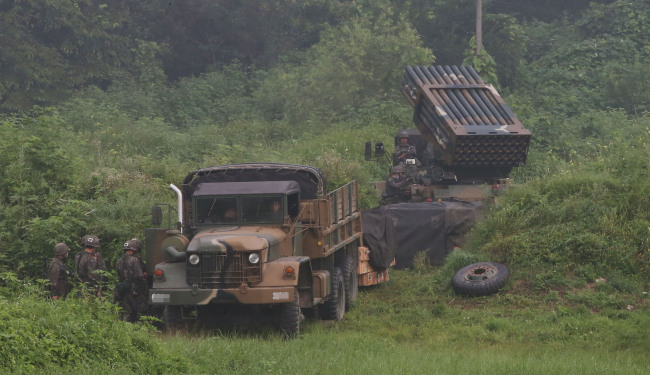Chances of an agreement from high-level crisis talks between South and North Korea are not high as long as South Korea insists that the North apologize for burying land mines that maimed two South Korean soldiers, a U.S. expert said Saturday.
The two Koreas held 10 hours of marathon talks at the border village of Panmunjom to find ways to defuse heightened tensions that had sparked fears of a major military clash along one of the world’s most heavily fortified border.
The sides failed to produce a breakthrough but agreed to resume the talks later Sunday.
Tensions between the two Koreas began rising after an investigation found that the North secretly planted land mines on the southern side of the border, which exploded and severely injured two South Korean soldiers early this month.
The South retaliated by resuming anti-Pyongyang propaganda broadcasts along the border, dealing a blow to one of the sore points for a regime underpinned by the tight control of information. An angered North Korea fired artillery rounds with the South earlier this week, which led to a rare exchange of fire between the two sides.
Details of the talks were not available, but it was widely believed that the South demanded the North apologize for the land mine and shelling provocations, while the North demanded the South halt the propaganda broadcasts.
“As for the chances of an agreement, I don’t see much chance as long as Seoul insists on an apology for the mine laying. If both sides can find a way around this issue, then it is possible,” said Ken Gause, a senior analyst on Korea at CNA Corp.
 |
| (Yonhap) |
“It’s the same reason about South Korea’s demand for the apology for the sinking of the Cheonan. North Korea does not admit either one of the provocations. Therefore, to admit and apologize right now will bring condemnation on the regime and on the supreme leader. And therefore, they cannot admit to this,” he said.
Halting the broadcasts is a priority, but the North wants it to be done on its own terms, he said.
From the broader perspective, the North’s ultimate goal is to break the stalemate in inter-Korean relations, he said.
“You cannot view this crisis and North Korea’s provocations in isolation,” he said. “North Korea’s calculus is driven by a desire to find a way to break the stalemate in inter-Korean relations.
Pyongyang’s return to a brinksmanship strategy is a way to force what the diplomatic charm campaign could not — to get Seoul to the negotiating table.”
Gause also said that the current situation shows North Korean leader Kim Jong-un does not want the situation to escalate too far, but he is likely to use aggression to keep Seoul engaged.
“I suspect the tension will continue throughout the exercises.
Another provocation is possible,” the expert said.
“Once the (South Korea-U.S.) exercises are over, if the situation has not gotten out of hand, both sides will de-escalate, and North Korea will assess the situation. They will seek engagement. If not successful, expect to see another provocation, such as a missile test.”
Evans Revere, senior director at the Albright Stonebridge Group, said the fact that the talks have taken place is important because it offers a chance for the two sides to de-escalate the crisis and prevent the confrontation from worsening.
South Korea entered the talks in a strong position because it made clear to the North that it will no longer tolerate Pyongyang’s provocations and aggression, Revere said. From this position, the South must have forthrightly conveyed its demand that the North apologize for the land mine attack and shelling, he said.
“I have no illusions that the North will actually apologize, but I believe that the North will demonstrate in some way that it will not carry out further attacks,” he said. “Although not fully satisfactory, if it does this, it could establish a new paradigm in North-South relations in which Pyongyang recognizes that it, too, would suffer from a future military confrontation.” (Yonhap)

